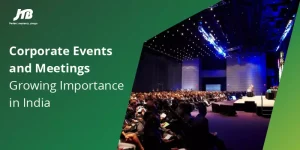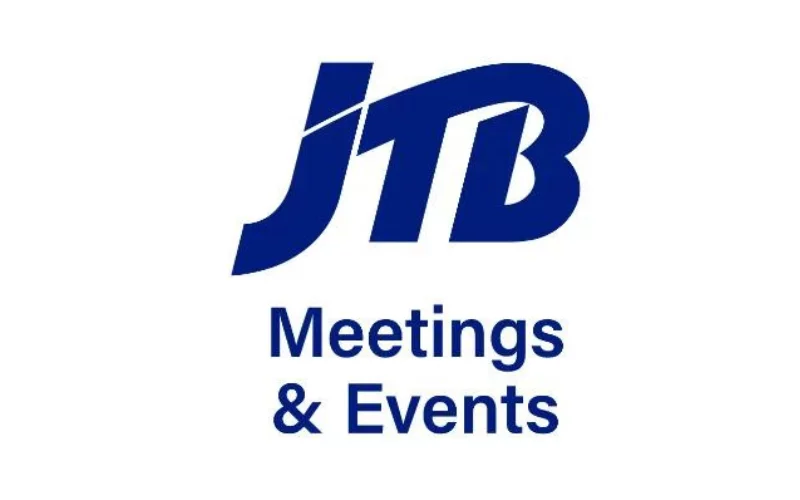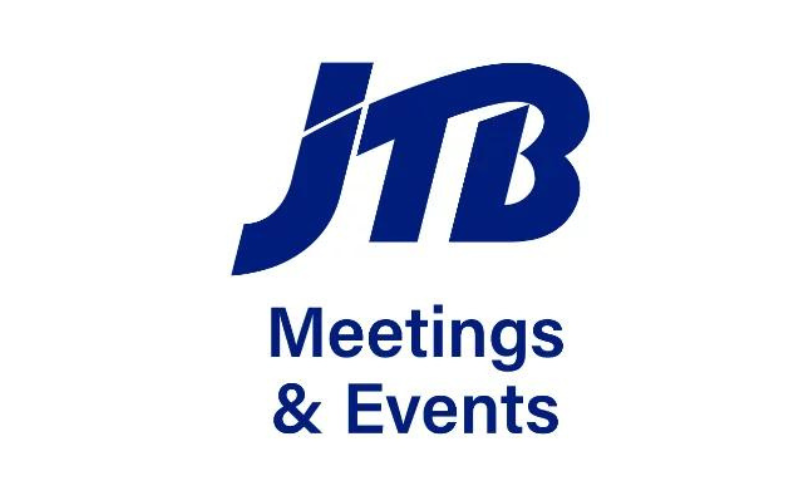Planning corporate events and meetings is a significant investment, with expenses quickly escalating for venue rental, catering, and transportation.
However, strategic meetings management and planning can maximize ROI and save costs without compromising quality.
By implementing effective strategies, it becomes possible to not only maximize return on investment (ROI) but also save costs without sacrificing the quality of your event.
Let’s explore expense-saving tips that can help you make the most out of your corporate events and meetings.
Before that, let’s find out what are corporate events and meetings and how you can leverage them.
Corporate Events and Meetings Growing Importance in India
Corporate events and meetings serve as vital components in the fabric of business functionality and success. While cost-cutting measures can be tempting, it is crucial to delve into the factors contributing to inflated costs before taking such steps.
- Teamwork and Communication: Events, like team-building exercises and collaborative projects, boost teamwork and communication among employees. These activities improve professional relationships and strengthen the overall unity of the team.
- Conferences and Workshops: Conferences and workshops are essential in India for professionals to share industry insights and stay updated on trends. These events contribute significantly to continuous learning and development, ensuring that attendees remain well-informed and adaptable in their respective fields.
- Networking Opportunities: Events provide valuable networking opportunities in the Indian business context, allowing professionals to connect with peers, clients, and industry experts. Building robust professional networks is emphasized, leading to collaborative opportunities and career advancement.
- Training Sessions and Workshops: Workshops and training sessions play a crucial role in enhancing employee skills and contributing to continuous professional growth in India. The emphasis on lifelong learning is strong, reflecting the recognition of staying updated to remain competitive.
- Social Events: Beyond relaxation, social events boost morale and foster a sense of belonging among Indian employees. These events create a space for unwinding, and personal connections, and contribute to a positive work culture, ultimately enhancing job satisfaction.
- Meetings for Decision-Making: Meetings provide a structured forum for decision-making, problem-solving, and strategic planning in the Indian corporate environment. They are essential for aligning team efforts, ensuring effective communication, and streamlining operations.
- Product/Service Showcasing: Events serve as effective platforms for showcasing products and services in India, attracting clients, and enhancing brand visibility. Businesses capitalize on these opportunities to establish a strong market presence.
- Annual General Meetings (AGMs): AGMs go beyond legal obligations in India; they inform shareholders about the company’s performance, plans, and financial standing. These meetings contribute to transparency and accountability, building trust among stakeholders.
- Recognition Events: Recognition events acknowledge and motivate employees for their hard work and achievements in the Indian workplace. Celebrating accomplishments fosters a positive work environment and encourages dedication and excellence.
- Problem Resolution through Meetings: Meetings are crucial for addressing challenges and crises in the Indian business landscape. Their structured nature allows for quick communication, collaborative problem-solving, and timely decision-making, ensuring operational efficiency in a fast-paced environment.
All these points highlight the growing importance of these events. Managing such events effectively contributes to the long-term success of the organization.
Now let’s understand the challenges that event planners face while managing events and meetings.
Understanding Cost Challenges for Event Planners in India
Event planners in India and elsewhere encounter significant hurdles when attempting to reduce costs for corporate events and meetings. These challenges stem from various factors that influence the intricate landscape of event management:
- Economic Volatility: Fluctuations in economic conditions and inflation directly impact the costs of essential goods and services, including venues, catering, and equipment.
- Venue Dilemma: The high demand for quality venues in popular cities creates a competitive environment, driving up costs and making it challenging to secure both affordable and desirable locations.
- Logistical Complexities: The vastness of countries like India introduces logistical challenges, particularly in transporting equipment, materials, and personnel over extended distances, leading to increased expenses.
- Tech Advancements: Staying abreast of technological innovations is imperative for offering cutting-edge event experiences, but this pursuit demands additional investments that impact the overall budget.
- Regulatory Compliance Struggles: Ensuring compliance with regulations and obtaining necessary licenses incurs extra costs, and failure to do so results in fines or disruptions during the event.
- Client Expectations Pressure: Meeting elaborate client expectations often involves additional costs, driven by specific event requirements or preferences that surpass initial estimates.
- Talent Acquisition Challenges: Hiring skilled professionals, vital for executing successful events, comes at a premium, contributing significantly to the overall cost structure.
- Seasonal Fluctuations: Event costs experience variations based on seasons, witnessing spikes in demand and prices during peak times, making budgeting a dynamic challenge.
- Escalating Marketing Expenses: Attracting attendees through effective marketing strategies requires a substantial investment in advertising, social media, and outreach efforts.
- Global Influences on Trends: Adapting to global industry trends, such as incorporating new event formats or sustainable practices leads to additional costs as event planners strive to stay competitive and relevant.
In light of these complexities, event planners are confronted with the delicate task of balancing cost-cutting measures with the need to deliver high-quality, innovative, and compliant events.
A nuanced understanding of these challenges is essential for crafting effective strategies to manage costs while ensuring the success and impact of corporate events.
Moving ahead, let’s now analyze the expenses in detail here with strategies.
Analyze the Expenses of Corporate Events and Meetings With Expense-Saving Strategies
Do you know that 79% of companies allocate a specific budget for events and team gatherings?
This statistic highlights the importance of these events for boosting communication, teamwork, and overall business growth. However, planning successful events without exceeding budgets can be challenging. To navigate the financial maze effectively, a thorough understanding of the various cost components is essential. Let’s delve into the details:
1. Venue Rental: The Stage for Your Event (and Budget)
Venues set the stage for your event’s ambiance and functionality. However, their rental fees can be the star of the expense sheet, varying significantly based on:
- Location: City center venues often command premium prices compared to suburban counterparts.
- Size: Accommodating a large audience naturally translates to higher rental costs.
- Amenities: On-site catering facilities, audio-visual equipment, and outdoor spaces can bump up the price tag.
Here are the expense-saving strategies:
- Be location-flexible: Explore venues outside prime areas if your event doesn’t require a central location.
- Right-size your venue: Don’t pay for empty space. Choose a venue that comfortably accommodates your expected attendance.
- Negotiate packages: Many venues offer deals for multi-day rentals or bundled services like catering and equipment.
- Consider alternative spaces: Hotels, co-working spaces, or even unique locations like museums can offer cost-effective options.
2. Catering: Fueling the Function (Without Burning a Hole in Your Pocket)
From coffee breaks to elaborate gala dinners, catering keeps your attendees energized and engaged. But the bill can quickly become hefty, depending on
- Meal types: Full buffets with multiple courses naturally cost more than simple coffee and snacks.
- Serving styles: Plated meals are pricier than buffets or cocktail receptions.
- Number of attendees: Larger events call for higher catering budgets.
Here are the expense-saving strategies:
- Offer a variety of options: Provide lighter fare alongside full meals to cater to diverse preferences.
- Get creative with serving styles: Consider cocktail receptions, boxed lunches, or food stations for a more casual and potentially cheaper approach.
- Negotiate bulk discounts: Partner with caterers for volume discounts, especially for large events.
- Explore external options: Consider off-site catering companies that might offer competitive rates.
3. Transportation: Moving Your Crew Without Breaking the Bank
Whether it’s shuttles for local attendees or flights for out-of-town guests, transportation can be a significant expense. Costs depend on:
- Location of the event: Remote locations might require additional travel arrangements like flights or coach rentals.
- Attendee travel arrangements: If responsible for travel, flight costs, and ground transportation add to the bill.
- Chosen transportation types: Taxis or private cars are naturally more expensive than public transportation or group shuttles.
- Chosen transportation types: Consider going with reputed transport companies only for safety and comfortable journeys and hassle-free billing.
- Suitable Modes of Transport: Look for Air travel for longer or outstation travel and land transport for short-haul destinations.
Here are the expense-saving strategies:
- Choose accessible venues: Opt for locations easily accessible by public transportation or within walking distance for local attendees.
- Negotiate group rates: Partner with airlines, coach companies, or ride-sharing services for discounted rates for large groups.
- Encourage carpooling and public transportation: Offer incentives like subsidized tickets or designated pick-up points to promote cost-effective travel options.
4. Audiovisual Equipment: Setting the Stage for Sight and Sound (Without Blowing the Budget)
From projectors and screens to microphones and sound systems, audiovisual equipment enhances the event experience. However, rental fees can add up:
- Equipment needs: The complexity of your presentation or entertainment requirements impacts the equipment needed and, consequently, the cost.
- Rental fees: Different vendors offer varying pricing structures, so comparing quotes is crucial.
Here are the expense-saving strategies:
- Utilize existing equipment: Leverage in-house projectors, screens, or sound systems if available.
- Partner with vendors for bundled packages: Negotiate deals with AV companies that offer equipment rentals along with technical support.
- Explore alternative technologies: Consider virtual presentations, live streaming, or interactive tools to minimize equipment needs.
5. Marketing and Promotional Materials: Spreading the Word Without Wasting Resources
Generating excitement and attracting attendees requires marketing and promotional materials. However, costs can quickly spiral depending on:
- Campaign scope: Brochures, posters, email campaigns, and social media ads all contribute to the expense.
- Materials used: High-quality printed materials come at a premium compared to digital alternatives.
- Distribution channels: Paid advertising adds to the marketing budget.
Here are the expense-saving strategies:
- Prioritize digital: Use social media, email, and a dedicated website to reach your audience effectively.
- Create engaging content: Produce videos, write articles, or host webinars to generate excitement.
- Partner up: Collaborate with sponsors and other events to share resources and expand your reach.
- Reuse and recycle: Adapt old marketing materials and go paperless to reduce printing costs.
- Track and analyze: Use analytics tools to measure what’s working and adjust your strategies accordingly.
7 Tips to Make Your Event a Success in Budget
Planning a successful event doesn’t require a bottomless budget. With some smart hacks, you can host a memorable experience while keeping your wallet happy:
1. Smart Venue Choices:
- Shop Around: Don’t settle for the first venue. Compare options in different locations, explore off-peak times for discounts, and negotiate pricing whenever possible.
- Think Outside the Box: Consider unique venues like museums or co-working spaces for cost-effective alternativ
2. Negotiate Like a Pro:
- Vendor Power: Get quotes from multiple vendors for everything from catering to equipment. Use these quotes as leverage to negotiate better deals, especially when bundling services.
- Tech Savvy: Ditch paper registration and embrace online platforms for a cheaper and more efficient solution.
3. Embrace Technology:
- Go Virtual: Virtual meetings and webinars eliminate venue costs and travel expenses, making them budget-friendly options.
- Automate Tasks: Invest in event management software to streamline planning, registration, and feedback collection, saving you time and money.
4. Logistics Made Easy:
- Plan Ahead: A detailed timeline and checklist ensure things run smoothly, avoiding last-minute rush fees.
- Travel Smart: Encourage carpooling, public transportation, or shuttle services for attendee travel instead of individual taxis.
- Cater Wisely: Choose cost-effective catering options like buffets or food stations, and avoid food waste by accurately estimating the number of attendees.
5. Saving the Planet, Saving Money:
- Go Green: Choose venues with energy-efficient practices and prioritize eco-friendly materials for decorations and promotional materials.
- Reduce Waste: Encourage reusable water bottles and minimize single-use plastic. Consider carbon offsetting your event’s footprint for an extra eco-friendly touch.
6. Partner Up for Success:
- Teamwork Makes the Dream Work: Collaborate with other organizations with similar goals to share costs and resources.
- Sponsor Spotlight: Attract sponsors who align with your event’s theme. Offer them promotional opportunities in exchange for financial support or in-kind contributions.
7. Measure and Improve:
Analyze the return on investment from your event to learn what worked and what could be improved in the future. This helps refine your strategy for even more budget-friendly events to come. To do that, you should
- Define your event objectives: Clearly define your event objectives and KPIs before the event takes place. This will help you track and measure the success of your event accurately.
- Collect data: Collect data throughout the event, such as attendee feedback, engagement metrics, and post-event surveys. This data will provide valuable insights into the effectiveness of your event and the satisfaction of your attendees.
- Analyze and evaluate: Analyze the data collected and evaluate the performance of your event against your defined objectives and KPIs. Identify areas for improvement and areas where cost savings were successfully achieved.
- Review your Event Spend: Continuous review and dashboard scores will help the event team and corporate know the position of event spending and draw comparisons for better negotiations with venues and suppliers.
By measuring and evaluating ROI, you can continuously improve your expense-saving strategies and ensure that future events are even more successful.
Remember, with some creativity, collaboration, and smart planning, you can host a fantastic event that won’t leave your budget feeling deflated.
Conclusion
As we wrap up this exploration of expense-saving strategies for corporate events and meetings, the key takeaway is clear: you can have your cake (a successful event) and eat it too (maintain a healthy budget). Also, 68% of companies reveal managing travel and accommodation to be their biggest challenge when organizing a company event.
But with the right approach, you can create memorable experiences that fuel communication, collaboration, and growth. And if you want to create such memorable budget-friendly events then explore JTB India. They strategically manage events, meetings, and conferences end to end and deliver maximum impact.



















